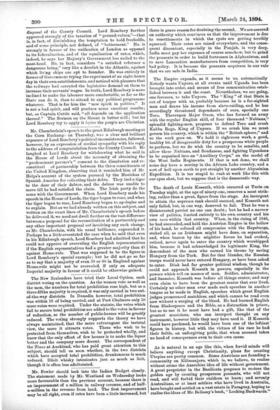Mr. Chamberlain's speech to the great Edinburgh meeting at the
Corn Exchange on Thursday, was a clear and brilliant exposure of Lord Rosebery's political inconsistencies, followed, however, by an expression of cordial sympathy with his reply to the address of congratulation from the County Council. He laughed at Lord Rosebery for withdrawing what he said in the House of Lords about the necessity of obtaining the "predominant partner's" consent to the dissolution and re- constituti of partnership between the three constituents of the United Kingdom, observing that it reminded him of Mr. Helps's account of the system pursued by the Mouiskas of Spanish America for collecting their debts. They tied a tiger to the door of their debtor, and the debtor was unable to move till he had satisfied the claim. The Irish party do the same with the Government. When Lord Rosebery made his speech in the House of Lords, the tiger began to roar, and when the tiger began to roar, Lord Rosebery began to apologise and to explain. But as we had already written on this subject, and written on the exact lines of Mr. Chamberlain's speech before he delivered it, we need not dwell further on the vast difference between a proposal for the reconstitution of a partnership and any other important proposal not involving any such change, as Mr. Chamberlain, with his usual brilliance, expounded it. Perhaps he a little overstated the case when he said that even in his Edinburgh speech, Lord Rosebery had admitted that he could not approve of overruling the English representatives if the English representatives had a greater majority than 45 against Home-rule. That was supposed to be the figure in Lord Rosebery's special example; but he did not go so far as to say that a majority of even 50 or 60 in England against Home-rule might not be overruled, if only an adequate Imperial majority in favour of it could be otherwise gained.


































 Previous page
Previous page